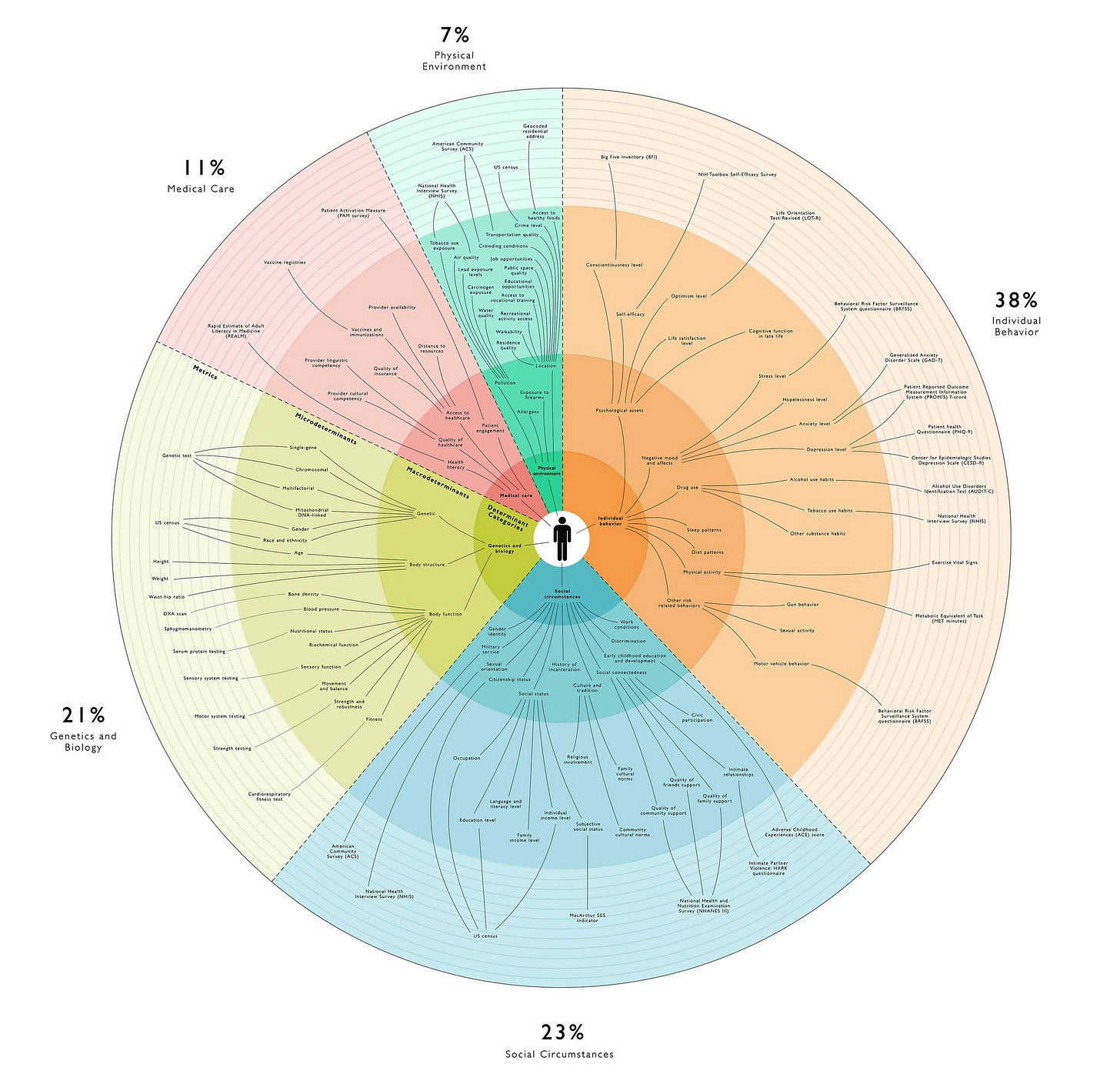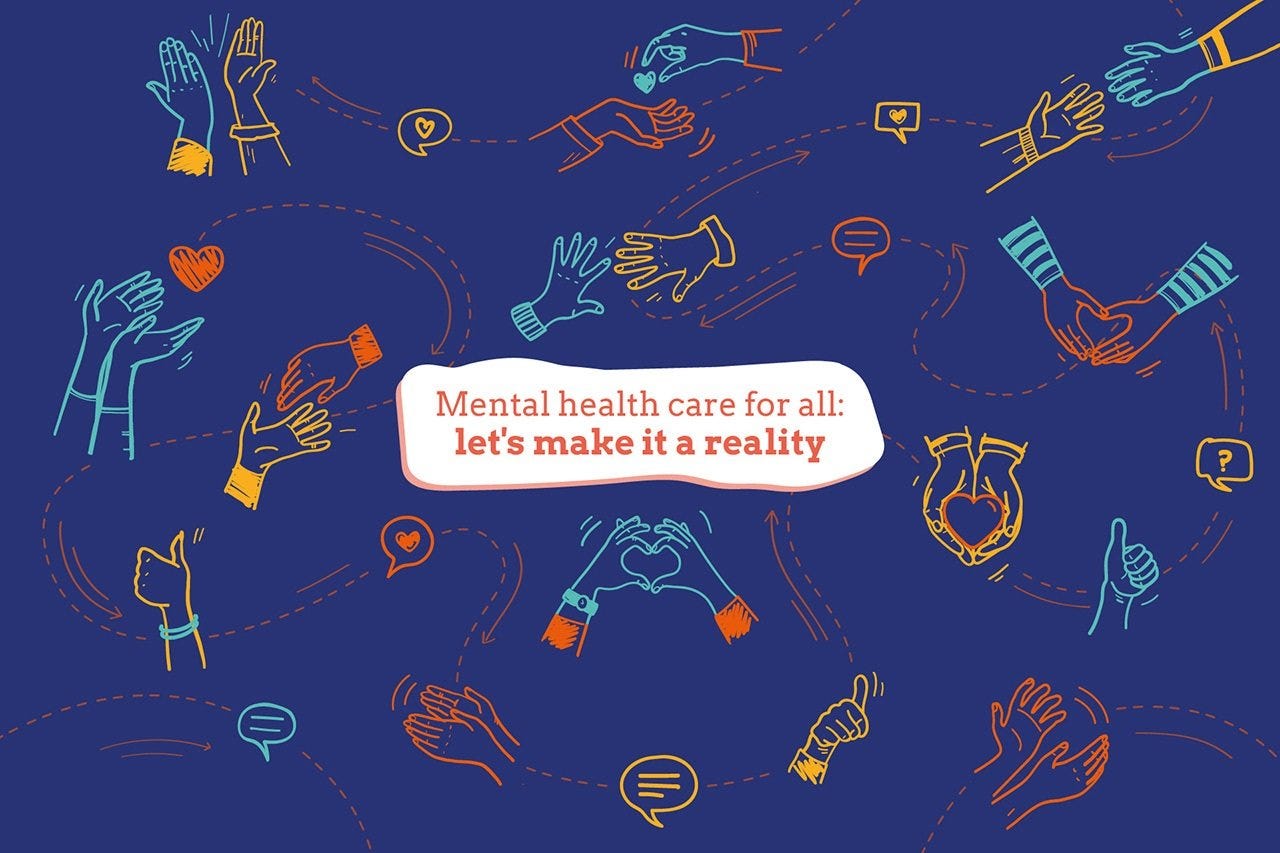Close to 1,000,000,000 people have a Mental disorder and Anyone, Anywhere, can be affected.
Commemorating the World Mental Health Day, 10th October 2021
Health is more than Medical Care
89% of health occurs outside of the clinical space through our genetics, behavior, environment and social circumstances. These factors are known as the social determinants of health which we at Aarogyam Institute of Integrated Medical Sciences, feel needs to be fixed alongside the expansion of Clinical Healthcare Ecosystem.
So be caring to your family, friends & Institutional Stakeholders…and lend a helping hand with an empathetic heart…
Mental health, defined by the World Health Organization (WHO), is
"a state of well-being in which the individual realizes his or her own abilities, can cope with the normal stresses of life, can work productively and fruitfully, and is able to make a contribution to his or her community".
According to WHO, mental health includes
"subjective well-being, perceived self-efficacy, autonomy, competence, intergenerational dependence, and self-actualization of one's intellectual and emotional potential, among others".
From the perspectives of positive psychology or of holism, mental health may include an individual's ability to enjoy life and to create a balance between life activities and efforts to achieve psychological resilience.
Cultural differences, subjective assessments, and competing professional theories all affect how one defines "mental health".
Self-Assess Your Mental Aarogyata…
Not sure if you or someone you know is living with mental health problems? Experiencing one or more of the following feelings or behaviors can be an early warning sign of a problem:
Take this quick Mental Aarogyata Survey 2021 to self-ascertain the state of your mental health, confidentially.
https://forms.gle/GEZeqxKZ1oTuhj6y9
KEY STATS PERTAINING TO MENTAL HEALTH
Close to one billion people have a mental disorder and anyone, anywhere, can be affected.
Depression is a leading cause of disability worldwide and is a major contributor to the overall global burden of disease. Globally, it is estimated that 5% of adults suffer from depression.
Globally, one in seven 10-19-year-olds experience a mental disorder. Half of all such disorders start by age 14 years but most are undetected and untreated.
People with severe mental disorders such as schizophrenia tend to die 10-20 years earlier than the general population.
One in every 100 deaths is by suicide. It is the 4th leading cause of death for young people aged 15-29 years.
The COVID-19 pandemic has had a considerable impact on people’s mental health.
Despite the universal nature and the magnitude of mental ill health, the gap between demand for mental health services and supply remains substantial.
Relatively few people around the world have access to quality mental health services.
The serious gaps that still exist in mental health care are a result of chronic under-investment over many decades in mental health promotion, prevention and care.
Stigma, discrimination and human rights abuses of people with mental health conditions remain widespread.
The lost productivity resulting from depression and anxiety, two of the most common mental disorders, costs the global economy US$ 1 trillion each year.
On average, countries spend just 2% of their national health budgets on mental health. This has changed little in recent years.
Despite an increase of development assistance for mental health in recent years, it has never exceeded 1% of development assistance for health.
Some of the most common mental health conditions, depression and anxiety, can be treated with talking therapies, medication, or a combination of these.
For every US$ 1 invested in scaled-up treatment for depression and anxiety, there is a return of US$ 5.
For every US$ 1 invested in evidence-based treatment for drug dependence, there is a return of up to US$ 7 in reduced crime and criminal justice costs.
Generalist health workers can be trained to diagnose and treat mental health conditions.
Regular health checks of people with severe mental disorders can prevent premature death.
The quality of life of people living with conditions such as autism and dementia can be greatly improved when their caregivers receive appropriate training.
The rights of people living with mental health conditions can be protected and promoted through mental health legislation, policy, development of affordable, quality community-based mental health services and the involvement of people with lived experience.
Mental Health Problems Affect Everyone
Do Pledge to Conduct a Mental Health Screening Camp at your Institution. Aarogyam Institute of Integrated Medical Science has developed an integrated suite to make this happen.
If you are interested, do ping Dr. Surbhi at 9811073154.
9 Myths Pertaining to Mental Health
Myth 1 : Mental health problems don't affect me.
Fact: Mental health problems are actually very common. In 2014, about:
One in five American adults experienced a mental health issue
One in 10 young people experienced a period of major depression
One in 25 Americans lived with a serious mental illness, such as schizophrenia, bipolar disorder, or major depression
Suicide is the 10th leading cause of death in the United States. It accounts for the loss of more than 41,000 American lives each year, more than double the number of lives lost to homicide.
Myth 2 : Children don't experience mental health problems.
Fact: Even very young children may show early warning signs of mental health concerns. These mental health problems are often clinically diagnosable, and can be a product of the interaction of biological, psychological, and social factors.
Half of all mental health disorders show first signs before a person turns 14 years old, and three quarters of mental health disorders begin before age 24.
Unfortunately, less than 20% of children and adolescents with diagnosable mental health problems receive the treatment they need. Early mental health support can help a child before problems interfere with other developmental needs.
Myth 3 : People with mental health problems are violent and unpredictable.
Fact: The vast majority of people with mental health problems are no more likely to be violent than anyone else. Most people with mental illness are not violent and only 3%–5% of violent acts can be attributed to individuals living with a serious mental illness. In fact, people with severe mental illnesses are over 10 times more likely to be victims of violent crime than the general population. You probably know someone with a mental health problem and don't even realize it, because many people with mental health problems are highly active and productive members of our communities.
Myth 4 : People with mental health needs, even those who are managing their mental illness, cannot tolerate the stress of holding down a job.
Fact: People with mental health problems are just as productive as other employees. Employers who hire people with mental health problems report good attendance and punctuality as well as motivation, good work, and job tenure on par with or greater than other employees.
When employees with mental health problems receive effective treatment, it can result in:
Lower total medical costs
Increased productivity
Lower absenteeism
Decreased disability costs
Myth 5 : Personality weakness or character flaws cause mental health problems. People with mental health problems can snap out of it if they try hard enough.
Fact: Mental health problems have nothing to do with being lazy or weak and many people need help to get better. Many factors contribute to mental health problems, including:
Biological factors, such as genes, physical illness, injury, or brain chemistry
Life experiences, such as trauma or a history of abuse
Family history of mental health problems
People with mental health problems can get better and many recover completely.
Myth 6 : There is no hope for people with mental health problems. Once a friend or family member develops mental health problems, he or she will never recover.
Fact: Studies show that people with mental health problems get better and many recover completely. Recovery refers to the process in which people are able to live, work, learn, and participate fully in their communities. There are more treatments, services, and community support systems than ever before, and they work.
Myth 7 : Therapy and self-help are a waste of time. Why bother when you can just take a pill?
Fact: Treatment for mental health problems varies depending on the individual and could include medication, therapy, or both. Many individuals work with a support system during the healing and recovery process.
Myth 8 : I can't do anything for a person with a mental health problem.
Fact: Friends and loved ones can make a big difference. Only 44% of adults with diagnosable mental health problems and less than 20% of children and adolescents receive needed treatment. Friends and family can be important influences to help someone get the treatment and services they need by:
Reaching out and letting them know you are available to help
Helping them access mental health services
Learning and sharing the facts about mental health, especially if you hear something that isn't true
Treating them with respect, just as you would anyone else
Refusing to define them by their diagnosis or using labels such as "crazy"
Myth 9 : Prevention doesn't work. It is impossible to prevent mental illnesses.
Fact: Prevention of mental, emotional, and behavioral disorders focuses on addressing known risk factors such as exposure to trauma that can affect the chances that children, youth, and young adults will develop mental health problems. Promoting the social-emotional well-being of children and youth leads to:
Higher overall productivity
Better educational outcomes
Lower crime rates
Stronger economies
Lower health care costs
Improved quality of life
Increased lifespan
Improved family life
Self-Assess Your Mental Aarogyata…
Not sure if you or someone you know is living with mental health problems? Experiencing one or more of the following feelings or behaviors can be an early warning sign of a problem:
Take this quick Mental Aarogyata Survey 2021 to self-ascertain the state of your mental health, confidentially.
https://forms.gle/GEZeqxKZ1oTuhj6y9
Mental Health Problems Affect Everyone
Do Pledge to Conduct a Mental Health Screening Camp at your Institution. Aarogyam Institute of Integrated Medical Science has developed an integrated suite to make this happen.
If you are interested, do ping Dr. Surbhi at 9811073154.



